March 4, 2010
RIVERSIDE - In a demonstration infused with dance, students and workers of the University of California, Riverside demanded an end to fee hikes, staffing furloughs, and cuts in class offerings. They chanted as they marched to downtown Riverside, where they were met by a contingent of student and worker activists from Riverside Community College for another rally. After the speeches, a carefully-orchestrated symbolic "death of public education" and die-in blocked traffic on University Avenue for about five minutes before protesters voluntarily cleared the street and avoided any threat of arrest.
Photo set 1: http://la.indymedia.org/news/2010/03/235667.php
Photo set 2: http://la.indymedia.org/news/2010/03/235687.php
Article: http://la.indymedia.org/news/2010/03/235709.php
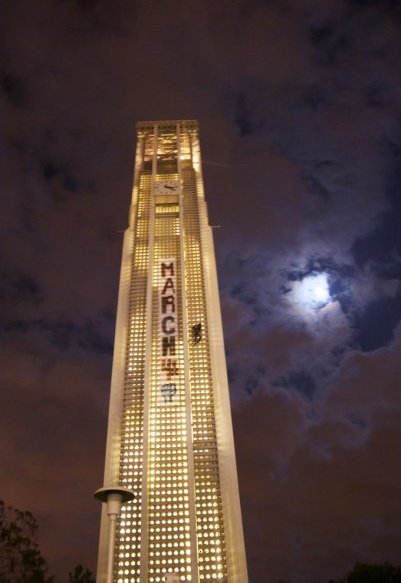 The Inland Empire Invisible Committee kicked things off by hanging a banner from the UCR Belltower in the wee hours of the morning that read "March 4th" and had a picture of a raised fist.
The Inland Empire Invisible Committee kicked things off by hanging a banner from the UCR Belltower in the wee hours of the morning that read "March 4th" and had a picture of a raised fist. Unfortunately, by the time of the convergence later on that morning, the banner had already been removed, but not before photos of it hit the internet. As students assembled at the base of the belltower, student organizers distributed red shirts to those without, taking small donations when possible. Students stencilled images and slogans on them.
Organizers handed out chant sheets with "March 4th Nonviolent Action Guidelines" on the back. Others handed out informative pamphlets and copies of After the Fall: Communiqués from Occupied California.
At about noon, speakers began rallying the crowd with chants, elocutions, and poetry.
The first speaker was Stephanie Kay, an educational worker at UCR and a member of the UCAFT, who spoke on behalf of "the non-Senate faculty." "We have a collective bargaining agreement with the UC, so we are both your teachers and workers in the great enterprise we call public education." Aristotle discussed the need for an enlightened body politic, she said, and expressing ourselves as an exercise of public education was one of the ways the philosopher thought we could reach our full potential as human beings. This lofty discourse was cut short, however, by breaking news. "I have just been in a meeting with the administration about your 1C classes, all the classes at the university, and how they've been cut. Well, this took the highfalutin right out of me! This is no time for highfalutin! This is a time for us to act. This is a time to think about how important demonstrations and student activism are, and how important it is for us to be in control and in charge of what our education is and could be and should be! What do we want? We don't want a compromised education. We don't want classes cut. We don't want to have to fight for the right to an affordable education for everyone! This is your right as citizens!" She urged a letter-writing campaign, and asked the students to involve their parents in "making noise," pointing to the effectiveness of protests for restoring canceled B classes, which stood in the way of many students from graduating.
The following speaker, a student organizer, cautioned against the militancy that has been present at some other student movement engagements. "I know that our brothers and sisters in other areas have had some not-so-peaceful, kinda violent things and we wanna let everyone know that that's not what we're about. We're about peace, we're about non-violence, we're about direct action."
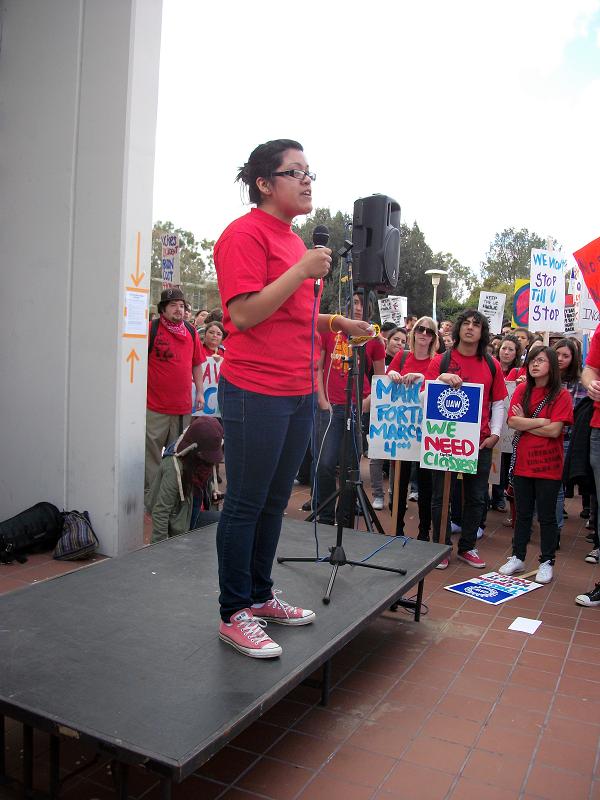 Adriana then orated on behalf of AB540 students. "If you don't know about AB540 students, they have to pay full tuition without any financial help, and that is not fair. Personally, I have to pay $12,000 a year for education out of my own pocket! That shit is not right! It is not right to have to work three jobs to pay for school. It is not right that I have to go through hunger just to pay for school. It is not right that I have to sleep in some of my classes when I should be learning. It is a shame!"
Adriana then orated on behalf of AB540 students. "If you don't know about AB540 students, they have to pay full tuition without any financial help, and that is not fair. Personally, I have to pay $12,000 a year for education out of my own pocket! That shit is not right! It is not right to have to work three jobs to pay for school. It is not right that I have to go through hunger just to pay for school. It is not right that I have to sleep in some of my classes when I should be learning. It is a shame!" Elliott spoke next. "As an IE native, this sight right here warms my heart. Roots, know what I'm saying? What's going on? They need soldiers for war, so what do they do? They cut education. So when the recruiters come knocking on the door, what do you tell them? What do you tell them? You say 'Hell no!' When you hear from that guy from the Navy with that nice little package and everything, what do you say?"
"Hell no!" the crowd shouted.
He reminded us that "this is a peaceful event. You guys have seen the news, things that are going down in other places, unnecessary destruction of property, all that stuff. It's about peace, and it's about building community, so keep it strong."
Michael, a librarian, then spoke about his involvement with the UC. "I went to UCI, I went to UCLA, I worked at those places, and I came here and I've been here for ten years, and this is the most active and the most dynamic student body I've seen in my time here. You should be proud of yourselves." He proclaimed the support of the librarians for the students, acknowledging that only student demands would lead to provision of services.
Next, a student organizer recited a poem called "The Separation."
He was followed by another speaker. "I'm with a group called Brown Issues, and what we've been doing is we've been holding down discussions of these things that need to be talked about, because we need to pick up the slack in these classrooms." He continued, "We've got 300 people in the class. Is there enough for individual attention? Man, I remember kindergarten, when you all sit down, the teacher says 'What do you need help with?', knows you by your name! And you just feel special, that bond with the teacher, you just feel the love that teacher. I miss those days!" He went on, "Where I'm from, sometimes I get lonely in the classroom, cause I look around and I say, ' Man, who knows what I'm going through?' I made it! I made it through the drugs, through the gangs, through the prostitution. When I think about it, I still feel that hand on my back, pushing me, just pushing me out of the institution called 'education.' They're pushing me out. They're saying, 'Yeah, you made it, but hey, it's time for you to go because you made it without money.'"
"So, we gotta rethink this idea of diversity, because when they call out people and they say 'We want diversity,' I got more in common with poor whites than I do with any rich Black, Brown, or Asian that Icould ever lay eyes on. I got more in common with them because they sit down and they say, 'We need diversity,' but that doesn't mean diversity of the mind."
He concluded, "It's a contradiction. It's not a business, it's education. We don't think about it like a business, bet they treat us like a business. They treat us like a commodity! And every one of us has a number above our heads of how much money they can bring in. So let's ask them next time, if you're gonna treat it like a business, then let's treat it like a business. Now, if we step into McDonald's, and they gonna mess up our order, we say, 'Hey, take this back!' We say, 'Either you make this right, or I get my money back. That's what we say! If they're gonna run this like a business, then we say, 'Either you gonna make this right, or you gimme my money back!'"
He was followed by a dining services worker from AFSCME, who shared how budget cuts are affecting workers. He pointed out that the priorities of the regents are giving raises and bonuses to executives, rather than education, where it should be. "I've never been a speaker, I'm just a cook right here," he began, as the crowd erupted into applause, "education of students is number one!" He ended with a chant: "When I say 'Fight back,' you say 'Fuck that!'" "Fight back!" "Fuck that!"
Paul, another educational worker, spoke about education as a public institution, shortages throughout the system, and his attempts to negotiate with decisionmakers, who have urged calm, patience, and reason. "Friends, I cannot be calm. I have lost my very patience. I will not wait! And today, in this matter, I am not a reasonable man!" He reminded us that "this country was born out of the spirit of rebellion and defiance."
Connie then addressed the students and workers. "57% of our taxes go to war. What can we do with 57% of our money? She subsequently invited us to the March 20th antiwar demonstration in Hollywood. "We have to show that we have a lot of people who care. These demonstrations are safer. Some people are concerned because of MacArthur Park. This is a coupla years ago when the police knocked cameras out of journalists' arms. The last demonstration I was in, the police let us do anything you wanted. They just stayed back and smiled, so I have no fear that they're gonna do anything to us."
Curtis, another worker from AFSCME then spoke, followed by another student organizer, who discussed a lobby visit to Sacramento. "When the new speaker was sworn in, you could hear us chanting outside. And the new speaker said, 'I stand with those students outside.' He then introduced UCR Chancellor Tim White. "He's been very supportive," one student told me, "he promised no reprisals against students and workers who participate today."
 The chancellor defected blame toward Sacramento, urging students to face north and thrice shout "fund education."
The chancellor defected blame toward Sacramento, urging students to face north and thrice shout "fund education." The speeches ended with the UFW unity clap, and then members of the UCR dance department taught the crowd some gestures to go along with the words, "Justice," "education," and "Equality." "It's kind of like yelling, except this time, you're gonna be moving." We learned the motions and practiced them. "You'll be hearing that throughout the day, and that'll be a way to unify, to stay together, and to keep pumped up."
Another round of poems and encouraging words was shared.
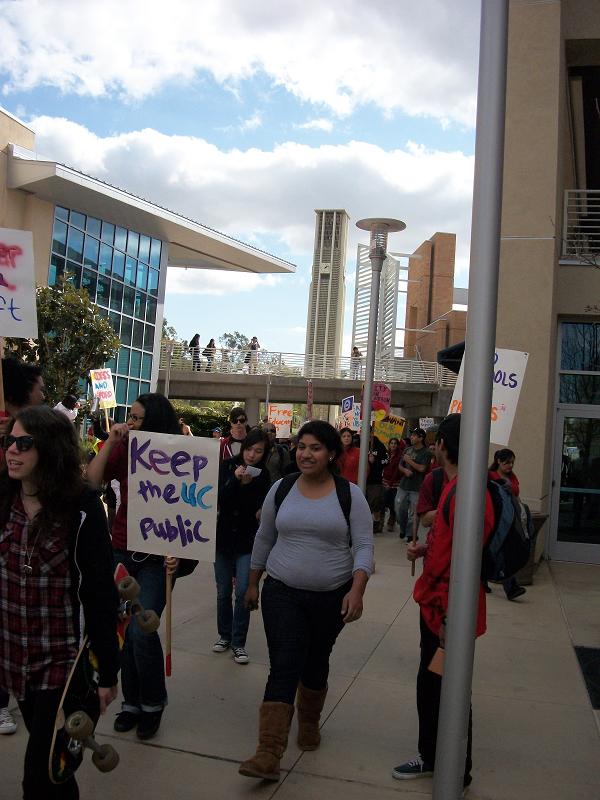 Then the march around the campus began, rallying students to walk out of class and join the resistance.
Then the march around the campus began, rallying students to walk out of class and join the resistance. About twenty-five trained "peacekeepers" lined the parade route, urging us to remain on the sidewalk. "Whose university?!" one protestor questioned when told where not to march.
Leaving the grounds, students marched down University Avenue, chanting and shouting all the while. "What do we want? Education!" "Whose univerity? Our university!" "No cuts, no fees! Education should be free!"
Meanwhile, a similar rally was going on at Riverside Community College, which also departed for downtown.
They stopped at the corner of Market and University, appropriating city electrical boxes to use them as drums to further the message. Passing motorists honked their support for the movement.
When the UCR contingent appeared on the horizon, a cheer went up and the RCC faction rushed to meet them in the downtown plaza.
After a while of chanting and milling about in front of the Sweeney Art Gallery,
another rally was held, repeating many of the speeches from the UCR rally. There was some variety, however. One student organizer spoke on behalf of immigration reform. We also heard from community college students, who spoke about the situation on their campuses. We were also treated to a stump speech from a Democratic politician, with the complicity of student organizers.
The UCR dance department performed another number, this one a Haitian dance.
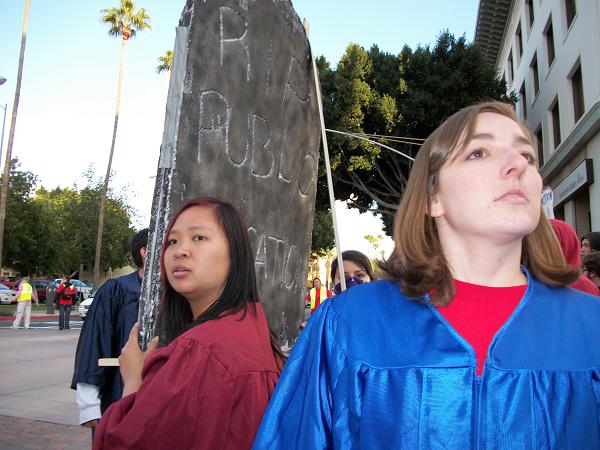 Shortly after the speeches, green-vested peacekeepers, with the support of LiUNA and Warehouse Workers United volunteers, stood alongside the crosswalks connecting the plaza to the other side of University Avenue. A large tombstone was placed in the center of the street, and a student frocked with a graduation robe was carried in to be laid to rest at its foot.
Shortly after the speeches, green-vested peacekeepers, with the support of LiUNA and Warehouse Workers United volunteers, stood alongside the crosswalks connecting the plaza to the other side of University Avenue. A large tombstone was placed in the center of the street, and a student frocked with a graduation robe was carried in to be laid to rest at its foot."These students represent the students pushed out of education by rising costs," declared a woman via megaphone. "We have the ability to realign our priorities in this state and prevent the death of public education." She then invited the members of the public to join in a die-in in the middle of the street, which we did.
Eventually, everyone got up and got out of the street. A few more words were said, and the rally was adjourned.
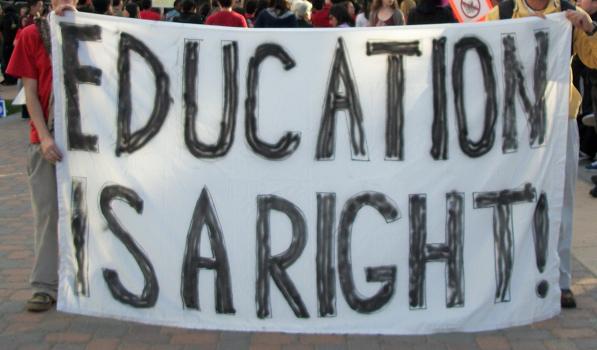
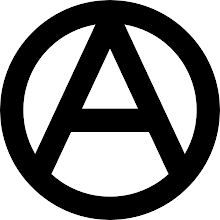
Check out Julio's post on LA Eastside:
ReplyDeletehttp://laeastside.com/2010/03/a-march-on-march-4th/